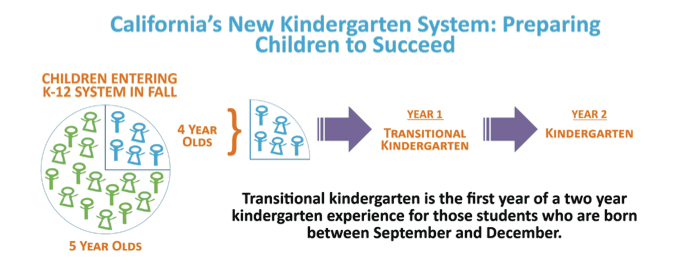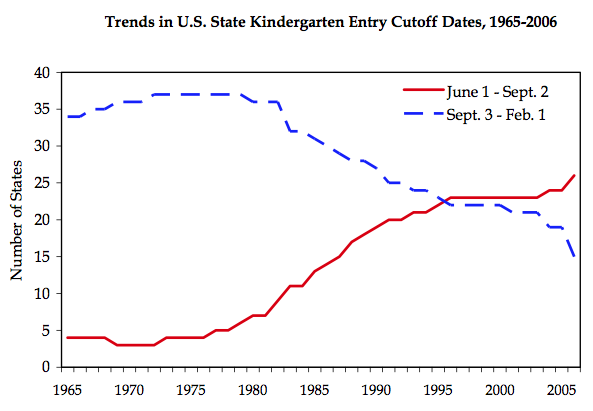
Two boys off to kindergarten ~ Photo by Jay Yohe
Child care advocates and leading educators are vigorously protesting the proposal in Governor Brown’s January budget to postpone, perhaps indefinitely, “transitional kindergarten” for 4-year-olds due to go into effect this fall.
In a tough response on its website, Preschool California, a nonprofit advocacy organization, called for “saving kindergarten” in California. It also ran letters from superintendents of many of California’s largest school districts including San Diego, Long Beach, Oakland and Fresno, as well as the Los Angeles Unified School District board president, all in essence calling on Brown to reconsider his proposal.
“Gov. Brown’s January budget proposal includes kicking 120,000 kids out of school over the next three years,” Preschool California declared.”This is a devastating blow for California’s young children. Cutting kindergarten is a lose-lose-lose-lose for California’s children, parents, teachers and schools.”

Graphic courtesy Preschool California
The 120,000 figure is the group’s estimate of the number of children excluded from kindergarten should the transitional kindergarten law be delayed indefinitely, instead of being phased in over the next three years as required by state law.
Under legislation authored by Senator Joe Simitian, D-Palo Alto (SB1381), during the coming school year an estimated 40,000 students who turned 5 in December were no longer going to be eligible to enroll in regular kindergarten, but would be able to enroll in transitional kindergarten instead. The following year, the same would apply to 40,000 children who turned 5 in November, and to the 40,000 students turning 5 in October in the year thereafter.
“This is the largest number of kids ever kicked out of public school in the nation’s history,” the group claims. By “kicking out” the group presumably refers to children who would have been eligible to enroll, not the children who are already enrolled in kindergarten.
What has especially angered child care advocates is that an estimated 40,000 4-year-olds who have not yet turned 5 by November would be barred from attending regular kindergarten if the Legislature enacts the changes Brown is proposing These are children who will still be 4 in November, and would normally have attended regular kindergarten had the Legislature not chosen to offer them transitional kindergarten classes instead.
Over the past 25 years, there have been a dozen or more unsuccessful efforts to approve legislation limiting kindergarten to children whose 5th birthday falls on or before September 1. Changing the eligibility date would have brought California in line with the practice in most other states.
Brown’s budget does not make it explicit that he intended to change what has been a longstanding practice to allow 4-year-olds who have not turned 5 by December 1 to attend kindergarten. That has led some childcare advocates to wonder whether he or his staff were entirely aware of the consequences of deferring implementation of transitional kindergarten, and projecting a savings of $223 million.
To capture those savings, school districts that would normally have received about $6,000 for each 4-year-old child in “average daily attendance” would not receive those funds, and thus contribute to their already considerable budget challenges.
A Department of Finance officials told EdSource that the administration was fully aware of the implications of its proposal. Even without transitional kindergarten, they said the change in the eligibility age for kindergarten was “good policy.” At the same time, they said any change would require action by the Legislature.
A 2008 Public Policy Institute of California report indicated that moving the kindergarten cut-off date to September 1 would likely increase test scores, because older children on average performed better academically. But such a chance could also widen the achievement gap between low-income and more affluent students, the report contended.

SOURCE: Public Policy Institute of California, 2008
The budget math around transitional kindergarten is counterintuitive. This year, and for the next 13 years, there would be no additional cost to the state. That is because the estimated 40,000 children who would have been eligible to attend transitional kindergarten this fall would have most likely have attended regular kindergarten if the law establishing transitional kindergarten had not been in place.
The first additional cost to the state would be 13 years from now (2025) when the students in the first transitional kindergarten class reach their senior year in high school—their 14th year of publicly supported education, compared to the 13 years that most Californians are typically eligible for.
Compounding the problem, childcare advocates say, is that children older than 4 years and 9 months would not be eligible for state subsidized child care, because they would be expected to sign up for regular kindergarten. Finance officials said that a change would need to be made to the preschool age cutoffs requirement to make it conform with any changes in kindergarten eligibility.
Another barrier is that the Brown budget calls for eliminating 70,000 child care slots, which would add to the scarcity of child care availability, even if the age eligibility rules for subsidized childcare were changed by the Legislature.
The text in the letters to Brown from education leaders and others were mostly identical. But in a handwritten note to Brown on one of them, Bill Taylor, president of the Los Angeles Urban League, wrote, “It is imperative that we not pull the rug from 120,000 kindergartners. The early years are the most vital and the children who will be affected disproportionately will be children of color.”
To get more reports like this one, click here to sign up for EdSource’s no-cost daily email on latest developments in education.















Comments (5)
Comments Policy
We welcome your comments. All comments are moderated for civility, relevance and other considerations. Click here for EdSource's Comments Policy.
Anon 12 years ago12 years ago
This sentence in the article is misleading: "It also carries letters from superintendents of some of California’s largest school districts such as San Diego, Long Beach, Oakland and Fresno, as well as the Los Angeles Unified School District board president, all in essence calling on Brown to reconsider his proposal." I went to the website and read a couple of the school district letters. At least those from Long Beach and San Diego were sent in December … Read More
This sentence in the article is misleading:
“It also carries letters from superintendents of some of California’s largest school districts such as San Diego, Long Beach, Oakland and Fresno, as well as the Los Angeles Unified School District board president, all in essence calling on Brown to reconsider his proposal.”
I went to the website and read a couple of the school district letters. At least those from Long Beach and San Diego were sent in December before Brown released his budget proposal (and before the dire budget circumstances that required massive CalWORKS cuts were known). If you read these letters, they do not reference any budget proposal to suspend the program requirement; much less do they ask for reconsideration.
Dorie Staack 12 years ago12 years ago
Our district implemented a transitional kindergarten program in the 2011-12 school year. We began nine classes of transitional kindergarten students who were all kindergarten age appropriate but whose parents would have chosen to hold them out to attend private preschools or stay home an additional year. The program has turned out to be wildly popular with our parents. The instruction has been carefully crafted to meet the developmental and maturational needs of … Read More
Our district implemented a transitional kindergarten program in the 2011-12 school year. We began nine classes of transitional kindergarten students who were all kindergarten age appropriate but whose parents would have chosen to hold them out to attend private preschools or stay home an additional year. The program has turned out to be wildly popular with our parents. The instruction has been carefully crafted to meet the developmental and maturational needs of these mostly four year old children. We are confident the program is beneficial to the students attending. Losing the ability to enroll our November 2nd to December 2nd students in transitional kindergarten next fall due to the Governor’s budget eliminating the ADA for such students is a major blow to both the students and their families. It is especially detrimental to the November 2nd to December 2nd students who can no longer attend kindergarten due to the change in kindergarten entry date, and now they also cannot attend transitional kindergarten classes either. I feel strongly that in tough years of ongoing budget cuts, the transitional kindergarten program was one area that was a positive example of what is right with education and it saddens me greatly to think it might not be able to go forward. Please find something else to cut. Education has already taken more than its fair share of state budget cuts and this particular cut will negatively impacts hundreds of our youngest students across California.
Dennis Kelly 12 years ago12 years ago
The elimination of Transitional Kindergarten does not help Brown’s budget. Just when we had a real chance to narrow achievement gaps by adding an additional year of schooling– not babysitting or childcare–the Governor is asking the state to take a step backward.
Don’t let this happen if you value the future of the state of California.
Sharon Scott Dow 12 years ago12 years ago
Advancement Project strongly supports Transitional Kindergarten. Transitional Kindergarten is NOT child care. School districts across the state are preparing for Transitional Kindergarten. California law (EC 48000) defines transitional kindergarten as “the first year of a two-year kindergarten program that uses a modified kindergarten curriculum that is age and developmentally appropriate.” While no state curriculum is mandated, which is likely a good thing, local education agencies must modify the local course of study in order … Read More
Advancement Project strongly supports Transitional Kindergarten. Transitional Kindergarten is NOT child care.
School districts across the state are preparing for Transitional Kindergarten. California law (EC 48000) defines transitional kindergarten as “the first year of a two-year kindergarten program that uses a modified kindergarten curriculum that is age and developmentally appropriate.” While no state curriculum is mandated, which is likely a good thing, local education agencies must modify the local course of study in order to provide age and developmentally appropriate curriculum for transitional kindergarten. This will give Kindergarten teachers and local school and school district curriculum leadership an opportunity to work with parents to meet the needs of their children.
The Achievement Gap actually begins before a child enters school. If Californian’s want their children to do better in school, it begins with early education.
Peggy Dodge 12 years ago12 years ago
This article overstates the "child care advocates" position by a long shot. Preschool California is one "child care advocate" and not the most representative of them. "Child Care Advocates" are more concerned about the decimation of the state preschool and child care programs administered by the California Department of Education, Child Development Division. More children, our most vulnerable, stand to lose the opportunity for early education services through those cuts than from the roll … Read More
This article overstates the “child care advocates” position by a long shot. Preschool California is one “child care advocate” and not the most representative of them.
“Child Care Advocates” are more concerned about the decimation of the state preschool and child care programs administered by the California Department of Education, Child Development Division. More children, our most vulnerable, stand to lose the opportunity for early education services through those cuts than from the roll back of the kindergarten start age.
Truth be told, most districts around California are not prepared to launch transitional kindergarten anyway. Mostly what they will do is put those transitional kindergarten age children into regular kindergartens, call it a “split class” and say that they “differentiate instruction” for the transitional kindergarteners.
Let transitional kindergarten go, flawed idea in the first place, and put energy to saving and strengthening the already existing system for educating children before they attend kindergarten.